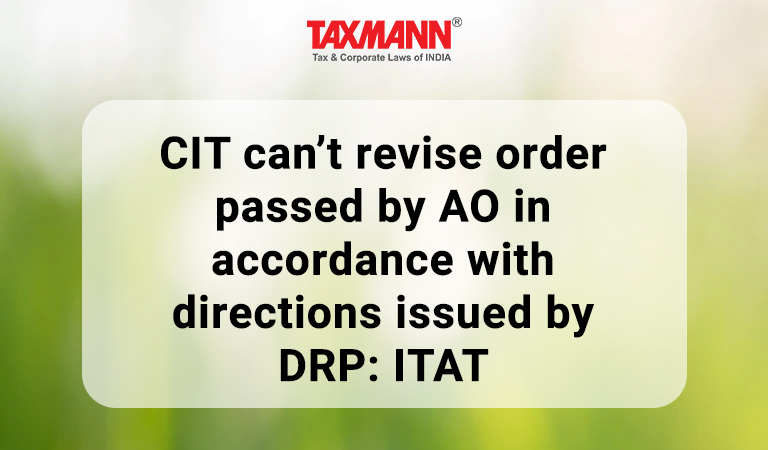CIT can’t revise order passed by AO in accordance with directions issued by DRP: ITAT
- Blog|News|Transfer Pricing|
- 3 Min Read
- By Taxmann
- |
- Last Updated on 7 July, 2022

Case Details: Barclays Bank PLC v. Commissioner of Income-tax (International Taxation) - [2022] 139 taxmann.com 503 (Mumbai-Trib.)
Judiciary and Counsel Details
-
- Shamim Yahya, Accountant Member & Amarjit Singh, Judicial Member
- P.J. Pardiwala & Madhur Agarwal for the Appellant.
- Sanjay Singh for the Respondent.
Facts of the Case
In the instant case, after due consideration of the evidence produced, including the order passed by the TPO, draft order as provided under section 144C(1) was prepared and sent to the assessee.
The assessee filed an objection against the said draft order before the DRP. The DRP passed the order under section 144C(5) and directed the Assessing Officer (AO) to give effect to the directions contained in the said order. Thereafter, the assessment order had been passed under section 143(3) read with section 144C(13) based on the direction of the DRP.
The Commissioner initiated proceedings under section 263 on the ground that the assessment order passed by Assessing Officer was erroneous and prejudicial to the interest of revenue. Aggrieved-assessee filed the instant appeal before the Tribunal.
ITAT Held
The Tribunal held that reading of section 263 shows that an order passed by the AO may be revised if the same is erroneous insofar as prejudicial to the interest of the revenue. Explanation 1(a) of section 263 also clarifies that the order of the AO in certain cases passed on the direction of certain superior officers can also be the subject matter of section 263.
However, said Explanation does not include the order passed under the direction of the DRP under section 144C(13). The Legislature in its wisdom has thought it appropriate to include orders passed by AO under direction under section 144A, but not under direction under section 144C(13).
The Commissioner in the given case seems to be quite conscious of this fact as he has mentioned on one of the issues, that AO has not properly followed the direction under section 144A. But, he is quite silent and has nowhere mentioned that the final assessment order is passed after the direction of the DRP.
It is apparent that members of the DRP are three in number and are individually equivalent in rank to the Commissioner, who is initiating proceedings under section 263 against the order passed pursuant to their direction.
Now as far as the equivalence of single Commissioner to a collegium of 3 Commissioners is concerned, it is settled law that bench comprising single person is not higher/superior to a collegium of three persons. Hence, it is abundantly clear that the DRP stands at a higher pedestal than the Commissioner passing an order alone.
Further, in the light of the provision of section 144C(13) which mandates that the AO has to pass an order in accordance with the direction of the DRP without giving any opportunity to the assessee. If this order passed is getting revised and AO starts giving the opportunity of hearing to the assessee in accordance with the direction of the Commissioner, the same will violate the sanguine provision of section 144C(13).
List of Cases Reviewed
-
- Virendra Kumar Jhamb v. N.K.Vohra [2009] 176 Taxman 11 (Bom.) (para 10) followed.
- Vodafone India Services (P.) Ltd. v. Union of India [2014] 50 taxmann.com 300/[2015] 228 Taxman 25/[2014] 368 ITR 1 (Bom.) (para 23) distinguished.
List of Cases Referred to
-
- Supertech Ltd. v Emerald Court Owner Resident Welfare Association [Misc Application No. 1572 of 2021, dated 4-10-2021] (para 18)
- Vodafone India Services (P.) Ltd. v. Union of India [2013] 39 taxmann.com 201/[2014] 221 Taxman 116/361 ITR 531 (Bom.) (para 20)
- Virendra Kumar Jhamb v. N.K.Vohra [2009] 176 Taxman 11 (Bom.) (para 23)
- Devas Multimedia (P.) Ltd. v. Pr. CIT [2019] 111 taxmann.com 494/[2020] 268 Taxman 150/[2019] 419 ITR 391 (Kar.) (para 25)
- Vodafone India Services (P.) Ltd. v. Union of India [2014] 50 taxmann.com 300/[2015] 228 Taxman 25/[2014] 368 ITR 1 (Bom.) (para 25).
Disclaimer: The content/information published on the website is only for general information of the user and shall not be construed as legal advice. While the Taxmann has exercised reasonable efforts to ensure the veracity of information/content published, Taxmann shall be under no liability in any manner whatsoever for incorrect information, if any.

Taxmann Publications has a dedicated in-house Research & Editorial Team. This team consists of a team of Chartered Accountants, Company Secretaries, and Lawyers. This team works under the guidance and supervision of editor-in-chief Mr Rakesh Bhargava.
The Research and Editorial Team is responsible for developing reliable and accurate content for the readers. The team follows the six-sigma approach to achieve the benchmark of zero error in its publications and research platforms. The team ensures that the following publication guidelines are thoroughly followed while developing the content:
- The statutory material is obtained only from the authorized and reliable sources
- All the latest developments in the judicial and legislative fields are covered
- Prepare the analytical write-ups on current, controversial, and important issues to help the readers to understand the concept and its implications
- Every content published by Taxmann is complete, accurate and lucid
- All evidence-based statements are supported with proper reference to Section, Circular No., Notification No. or citations
- The golden rules of grammar, style and consistency are thoroughly followed
- Font and size that’s easy to read and remain consistent across all imprint and digital publications are applied



 CA | CS | CMA
CA | CS | CMA
